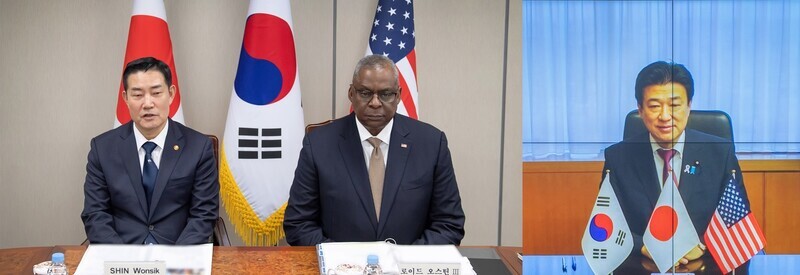hankyoreh
Links to other country sites 다른 나라 사이트 링크
Defense chiefs of S. Korea, US, Japan agree to start sharing real-time NK missile data in December

South Korea, the US and Japan agreed to activate a mechanism for real-time sharing of missile alerts starting in December. The three countries also decided to conduct trilateral drills more systematically and efficiently starting in January 2024.
The three countries appear to be speeding up efforts to bolster security cooperation by giving shape to agreements South Korean President Yoon Suk-yeol, US President Joe Biden and Japanese Prime Minister Fumio Kishida made during their trilateral summit at Camp David this past August.
The South Korean Defense Ministry shared that these agreements were made among South Korean Defense Minister Shin Won-sik, US Defense Secretary Lloyd Austin, and Japanese Defense Minister Minoru Kihara during their meeting on Sunday. Shin and Austin met in person at the South Korean Defense Ministry complex in the Yongsan District of Seoul, while Kihara joined the meeting virtually.
South Korea, the US and Japan upgraded their security cooperation to the level of a quasi-alliance when their leaders agreed to activate a real-time alert sharing system regarding North Korean missiles before the end of the year and regularize yearly trilateral military drills in multiple fields during their trilateral summit at Camp David in August. Sunday’s meeting of the three nations’ defense chiefs was an occasion to examine and flesh out the fulfillment of these agreements.
This was the first time a South Korea-US-Japan defense ministers’ meeting took place as a stand-alone event rather than during multilateral meetings such as the Shangri-La Dialogue or the ASEAN Defense Ministers’ Meeting-Plus, which can be seen as a display of emboldened trilateral security cooperation.
At the meeting, the three defense chiefs “decided on a mechanism to facilitate the exchange of real-time missile warning data and improve each country's ability to monitor missiles launched by [North Korea]. They confirmed that the data sharing mechanism is in the final stages of testing and agreed to fully operationalize the mechanism by the end of December,” according to a joint press statement released following the meeting.
Real-time missile alert sharing would enable each country to reduce the error of their detection assets and carry out joint responses within a short time span.
“They also encouraged accelerated development of a multi-year trilateral exercise plan, which is currently being formulated to conduct trilateral exercises more systematically and efficiently and is scheduled to be finalized by the end of 2023,” the statement read.
South Korea’s Ministry of National Defense noted that the three defense chiefs “agreed to continue to expand trilateral exercises to cover a wide range of areas.”
The US Navy and Japan Maritime Self-Defense Force have been carrying out anti-submarine drills and search and rescue exercises for disaster response and humanitarian assistance on an irregular basis in response to actions by North Korea, including missile launches. However, following an agreement at the Camp David summit in August, the three countries agreed to further systematize and regularize trilateral exercises from 2024.
“I think this meeting was one in which the US, South Korea and Japan strengthened their cooperation and response to North Korea’s nuclear and missile programs and aligned their positions on global security,” said Shin Jong-woo, the secretary general of the Korea Defense and Security Forum.
“It can be seen as the first step in expanding the US missile defense system,” said military expert Kim Jong-dae, a visiting scholar at Yonsei Institute for North Korean Studies. “However, there are technical limitations, so it is questionable how precisely the trilateral missile warning information sharing system will work.”
Meanwhile, Monday’s US-South Korea Security Consultative Meeting is expected to result in an agreement to allow the South Korean military to freely utilize information from US early warning satellites.
This will fill in the gaps in Korean military radar where it cannot pick up immediately after a missile is launched or just before it falls.
By Shin Hyeong-cheol, staff reporter
Please direct questions or comments to [english@hani.co.kr]

Editorial・opinion
![[Editorial] Perilous stakes of Trump’s rhetoric around US troop pullout from Korea [Editorial] Perilous stakes of Trump’s rhetoric around US troop pullout from Korea](https://flexible.img.hani.co.kr/flexible/normal/500/300/imgdb/original/2024/0509/221715238827911.jpg) [Editorial] Perilous stakes of Trump’s rhetoric around US troop pullout from Korea
[Editorial] Perilous stakes of Trump’s rhetoric around US troop pullout from Korea![[Guest essay] Preventing Korean Peninsula from becoming front line of new cold war [Guest essay] Preventing Korean Peninsula from becoming front line of new cold war](https://flexible.img.hani.co.kr/flexible/normal/500/300/imgdb/original/2024/0507/7217150679227807.jpg) [Guest essay] Preventing Korean Peninsula from becoming front line of new cold war
[Guest essay] Preventing Korean Peninsula from becoming front line of new cold war- [Column] The state is back — but is it in business?
- [Column] Life on our Trisolaris
- [Editorial] Penalties for airing allegations against Korea’s first lady endanger free press
- [Editorial] Yoon must halt procurement of SM-3 interceptor missiles
- [Guest essay] Maybe Korea’s rapid population decline is an opportunity, not a crisis
- [Column] Can Yoon steer diplomacy with Russia, China back on track?
- [Column] Season 2 of special prosecutor probe may be coming to Korea soon
- [Column] Park Geun-hye déjà vu in Yoon Suk-yeol
Most viewed articles
- 1Nuclear South Korea? The hidden implication of hints at US troop withdrawal
- 2[Editorial] Perilous stakes of Trump’s rhetoric around US troop pullout from Korea
- 3[Photo] ‘End the genocide in Gaza’: Students in Korea join global anti-war protest wave
- 4Behind-the-times gender change regulations leave trans Koreans in the lurch
- 5‘Free Palestine!’: Anti-war protest wave comes to Korean campuses
- 6Korean president’s jailed mother-in-law approved for parole
- 7Dermatology, plastic surgery drove record medical tourism to Korea in 2023
- 8[Guest essay] Preventing Korean Peninsula from becoming front line of new cold war
- 9In Yoon’s Korea, a government ‘of, by and for prosecutors,’ says civic group
- 10Real-life heroes of “A Taxi Driver” pass away without having reunited